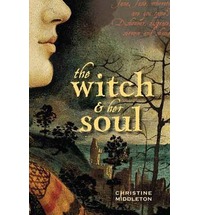The Witch and her Soul
There have been many novels about the Lancashire witch trials of 1612 but for many modern readers the tragedy and horror of the events is compounded by an incomprehension of how such ridiculous ‘confessions’ could be taken seriously enough to bring a group of mainly poor, illiterate people to the public gallows.
Middleton takes as her protagonist one Jane Southworth of Samlesbury Lower Hall. Literate, if not educated, thoughtful and often outspoken, Jane is our window into the c17th mind. As the bastard daughter of gentry she is brought up in the hotbed of recusant Catholicism that is Lancashire. Hidden priests, secret masses and rural folk beliefs based on papist prayers and rituals are normal for her. As is the rule of men who, although often not educated themselves, have an intuitive predatory understanding of what it takes to survive and for a family dynasty to flourish. A questioning woman has no role in this world. James I reputedly said that educating women was as dangerous as training foxes and Middleton realistically brings out in her story just how malevolent male fear of women could be. Equally it comes as entirely plausible that if a fervently wished for event should happen, does not the wisher have responsibility for the happening?
Jane Southworth takes the highly unusual step of committing the truth of her life to a journal, started at her husband’s deathbed. Through her words we see her world and are given an understanding of how strange it would be to us to live in that world, and just how perilously easy it could be to find oneself accused, and condemned, of witchcraft. Jane Southworth was a real witness to the events she describes. Unfortunately her journal is Middleton’s creation but what a wonderfully effective mirror it gives. Perhaps the final words she gives Jane are as true today as ever: ‘God save us all from the pity of pitiless men’.
What a wonderful novel by a debut author! One of the best novels I have read this year!










